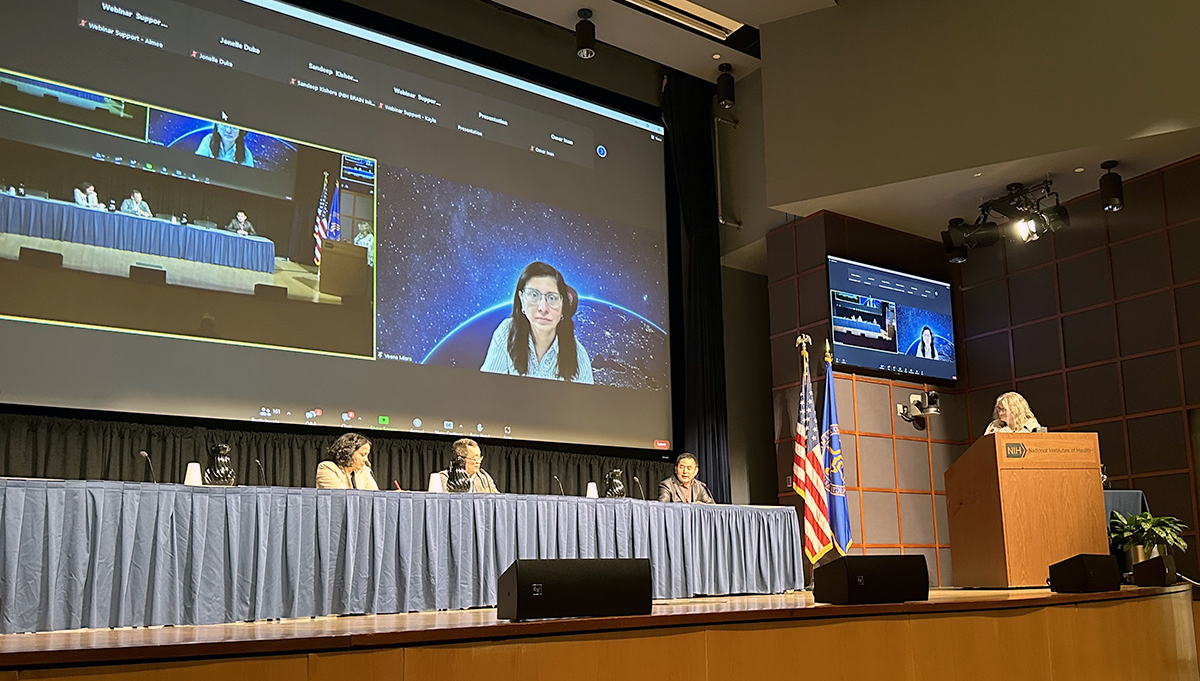 |

|
 |
Photo caption: Dr. Svetlana Tatic-Lucic (right) of the National Science Foundation and Lehigh University, introduces the second group of speakers on sensors. Dr. Ghodssi was one of seven speakers on this topic at the workshop on the NIH campus in Bethesda, Md. |
|
Professor Reza Ghodssi (ECE/ISR) was an invited speaker at the National Institute of Mental Health Workshop on Brain Behavior Quantification and Synchronization on May 2. The event theme was “Sensor Technologies to Capture the Complexity of Behavior.” The workshop was held on the National Institutes of Health main campus in Bethesda, Md., where more than 100 attendees were in the audience, in addition to 1,100 people watching online.
Ghodssi spoke on “Serotonin Sensing Technologies to Promote Understanding of the Gut Brain Axis and the Physiological Role of Serotonin in Behavior.” He outlined his lab’s (MEMS Sensors and Actuators Laboratory) work in developing systems for in vitro, ex vivo, and in vivo electrochemical sensing of the neurotransmitter serotonin. As part of the gut-brain axis, a bidirectional biochemical signaling pathway between the gastrointestinal tract and the central nervous system, serotonin plays an important physiological role in our behavior, cognition, and pathophysiology. The specific mechanics of how this system works are not well understood.
Ghodssi’s lab has developed in vitro sensors that can monitor serotonin release from enterochromaffin-like cells cultured onto a semipermeable substrate, as well as systems that can monitor serotonin changes and study behavior in animal models. Also, ex vivo sensing of serotonin in animal tissue has proved serotonin sensing is possible with a surface-modified carbon fiber microelectrode. This electrochemical sensing technology was translated to a stand-alone system for in vivo serotonin monitoring in free-moving crayfish to study animal behaviors. The lab is also advancing a non-invasive in vivo micro device that can measure and monitor serotonin released by enterochromaffin cells within the GI tract. This device is an ingestible real-time wireless electrochemical sensing system. Future MSAL systems will focus on penetrative systems to achieve basolateral serotonin modulation monitoring.
These new serotonin sensing systems should improve researchers’ ability to study serotonin’s role in animal behavior, understand mechanisms within the gut-brain axis, and better grasp how serotonin relates to brain function.
| View the full workshop agenda at the NIMH website |
Special note: Ghodssi also will be a guest editor for a forthcoming special issue of IEEE Sensors Letters. View and download the call for papers.
Related Articles:
MSAL’s work on serotonin characterization and detection results in two journal covers
Symptoms all in your head—or in your gut? Maybe a little of both.
New ‘FRRB’ packaging technology may solve an ingestible capsule challenge
University of Maryland Research is Redefining Health Care
Adjustable Drug Release Marks New Milestone in Ingestible Capsule Research
Research Paper and Cover Art Now Feature Article in Journal
Ingestible Capsule Advances May Lead to Earlier Detection of Diseases
New features on ingestible capsule will deliver targeted drugs to better treat IBD, Crohn’s disease
Ingestible Capsule Technology Research on Front Cover of Journal
Gut Health Monitoring Gas Sensors Added to Ingestible Capsule Technology
May 2, 2023
|

